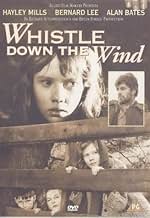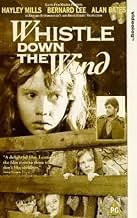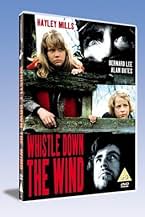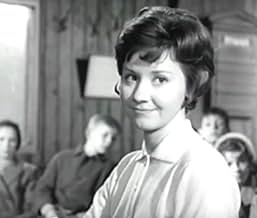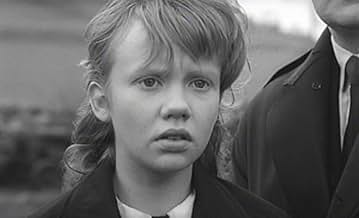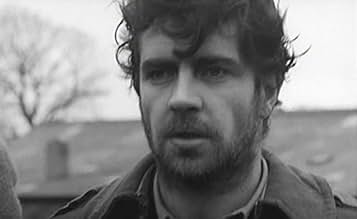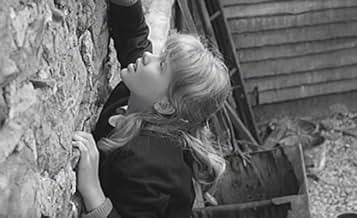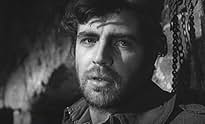AVALIAÇÃO DA IMDb
7,6/10
4 mil
SUA AVALIAÇÃO
Adicionar um enredo no seu idiomaWhen an injured wife murderer takes refuge on a remote Lancashire farm, the owner's three children mistakenly believe him to be the Second Coming of Christ.When an injured wife murderer takes refuge on a remote Lancashire farm, the owner's three children mistakenly believe him to be the Second Coming of Christ.When an injured wife murderer takes refuge on a remote Lancashire farm, the owner's three children mistakenly believe him to be the Second Coming of Christ.
- Direção
- Roteiristas
- Artistas
- Indicado para 4 prêmios BAFTA
- 1 vitória e 5 indicações no total
- Direção
- Roteiristas
- Elenco e equipe completos
- Produção, bilheteria e muito mais no IMDbPro
Avaliações em destaque
Hayley Mills excels in this understated, underrated movie juxtaposing the sordid criminal world (Alan Bates as a murderer on the run) with the innocence of children. Cleverly designed, perfectly acted (by all the children as well as the adults), pithily appropriate screenplay, believable accents (the setting is the Yorkshire moors in England), and a well-balanced, carefully planned production all combine to produce a mesmerising gem of a film. Already a star, Hayley Mills proved she was not just a pretty face and built on her impressive performance in Tiger Bay to create a moving character of budding adolescence, still trapped in childhood innocence and belief. The period of the early sixties is neatly conveyed, and Hayley Mills as Cathy creates a metaphor for the deeper layer of the film's message of the increasing social awareness and diminishing religious belief (despite the traditional Sunday School attitudes and practices) which was gradually bringing about the social change of Britain in the sixties. The story is well told, the drama is dynamic, the actors do a marvellous job and the film certainly deserves to be better known, if not least because it's an early example of Richard Attenborough's production skills.
Forbes' well-loved film performs a delicate balancing act between symbolism and naturalism, and does so with sensitivity and humour. His achievement becomes more evident when one considers the recent Andrew Lloyd-Webber version of this story, which considerably Americanised and coarsened it, floundering badly as a result. Director Forbes, whose first and arguably finest film this was, had previously been better known as an actor. His skills and experience are in evidence from the start here, as he brings the best out of the children who make up a good proportion of his cast.
In a film that has a lot to say about the grander issues of religion, a lot of the real pleasure here comes from the quieter interactions between youngsters, as they either gauchely hide things from their elders, or express the ironies of simple belief. Juxtaposing the innocence of childhood with the cruelty and persecution of the adult world, and with a fair dose of symbolism and various interpretative levels, the result is in some contrast to the other prestigious productions of the time. The recent ground breaking kitchen sink dramas such as that by Karel Reisz (Saturday Night And Sunday Morning, 1960) or pictures of aggressive social mobility from Jack Clayton (Room At The Top, 1959) were full of working class characters. They focussed on the newly discovered reality of their aims and aspirations, and were part sociological exploration of class, part attempt to wrestle poetry of sorts from everyday life. While Whistle Down the Wind benefits from the breath of fresh air currently blowing through the British industry - the location shoot and naturalistic performances are especially characteristic and effective - the sympathetic portrayals in the film serve to emphasise the fact that its concerns are less sociological than theological, even if its slightly self-conscious air shows a continuing concern to gain a 'significance' from the community, at least of some sort. It's a film where outright class-consciousness rarely raises its head while the anger of the times, seen elsewhere on the contemporary screen, is almost entirely absent. In fact when they occur at all, such issues only appear in the context of organised religion, as for instance when the children encounter the doctrinal certainties of the local vicar, an aloof establishment figure, much more concerned with the vandalism of his church than the urgent questions of his young parishioners. The irony is of course that, while discussing the missing guttering from the church, he is entirely unaware that real spirituality exists in the barn down the road in the hearts of children.
Whistle Down The Wind is something of a family affair, in more ways than one. Not only do the principals mostly spring from the Bostock family or their close acquaintances, but the film itself is based on a novel by Mary Hayley Bell, the wife of actor John Mills and mother of Hayley - who plays the lead Kathy. Some have objected that she is too old to play the part and, strictly speaking this is true, although on screen her proximity to womanhood allows her "I love you" to The Man Blakey (Alan Bates) a meaning potential unavailable to a younger performer. Hayley's role and performance reminds one of another she had provided a couple of years back, in Tiger Bay, a related tale of a platonic love between a child and a murderer. The star spent a good deal of her early career in British film persuading audiences that she could successfully grow up on screen.
Much of the success of the film springs from its gentle and sophisticated treatment of religion. Put in the mouths of babes, doctrinal criticism is thereby sidestepped and the biggest, potential, objection to the piece - that the confusion of a murderer with Christ might be blasphemous - is largely defused by having The Man say very little (his main conversation, an imitation of the parables, is a re-telling to a rapt audience of 'Ruth Lawrence, air hostess' from a comic). The mistake in recognition is made by innocents, and is therefore understandable. The director overcomes objections by charm. And while Forbes has his Man reinforce the mistaken impression by his opening words, the first sight of him, arms outstretched newly appeared in a 'stable' (a evocative stance reprised as he ultimately surrenders), suggestive heavenward point-of-view-shots and so on, the audience is never made to feel uncomfortable with the suggestions. In fact at a time when the BBFC had firm views on the Church and established religion seen on screen, the only other title that comes easily to mind dealing with such matters in a light-hearted and successful way is the very different Boulting brothers' Heavens Above!, with Peter Sellars.
The film's charm is greatly enhanced by a memorable score by Malcolm Arnold, the highlight of which is reworking of We Three Kings - perkily reprised up tempo as the trio of youngsters pay their homage to their 'Christ', or while choreographing a march down the road. The ensemble playing of the film is excellent. Bernard Lee (more familiar to audiences as 'M' in the James Bond series) turns in sterling work as father Bostock, while among the younger actors Alan Barnes as Charlie is also a standout. It is Charlie who expresses the final disillusionment: "It isn't Jesus, it's just some fella," but faith of sorts remains amongst many of the children, even as Blakey is led away. The film's final sense is of religious reinforcement rather than disappointment ("You missed him this time but he'll be coming again," Kathy tells some latecomers to the barn) while the details of the murder in question is left sufficiently vague so as not to entirely deprive Bates' character of sympathy, even as he is handed over to the authorities. There's a sense that the killer has been redeemed by the innocence and trust of his admirers rather than the other way round - a subtly ironic turn of events, which never the less makes for a satisfying conclusion. For those who enjoy British cinema of this decade the charming experience offered by Forbes' debut is unmissable, while others who have seen the film before there will be no hesitation.
In a film that has a lot to say about the grander issues of religion, a lot of the real pleasure here comes from the quieter interactions between youngsters, as they either gauchely hide things from their elders, or express the ironies of simple belief. Juxtaposing the innocence of childhood with the cruelty and persecution of the adult world, and with a fair dose of symbolism and various interpretative levels, the result is in some contrast to the other prestigious productions of the time. The recent ground breaking kitchen sink dramas such as that by Karel Reisz (Saturday Night And Sunday Morning, 1960) or pictures of aggressive social mobility from Jack Clayton (Room At The Top, 1959) were full of working class characters. They focussed on the newly discovered reality of their aims and aspirations, and were part sociological exploration of class, part attempt to wrestle poetry of sorts from everyday life. While Whistle Down the Wind benefits from the breath of fresh air currently blowing through the British industry - the location shoot and naturalistic performances are especially characteristic and effective - the sympathetic portrayals in the film serve to emphasise the fact that its concerns are less sociological than theological, even if its slightly self-conscious air shows a continuing concern to gain a 'significance' from the community, at least of some sort. It's a film where outright class-consciousness rarely raises its head while the anger of the times, seen elsewhere on the contemporary screen, is almost entirely absent. In fact when they occur at all, such issues only appear in the context of organised religion, as for instance when the children encounter the doctrinal certainties of the local vicar, an aloof establishment figure, much more concerned with the vandalism of his church than the urgent questions of his young parishioners. The irony is of course that, while discussing the missing guttering from the church, he is entirely unaware that real spirituality exists in the barn down the road in the hearts of children.
Whistle Down The Wind is something of a family affair, in more ways than one. Not only do the principals mostly spring from the Bostock family or their close acquaintances, but the film itself is based on a novel by Mary Hayley Bell, the wife of actor John Mills and mother of Hayley - who plays the lead Kathy. Some have objected that she is too old to play the part and, strictly speaking this is true, although on screen her proximity to womanhood allows her "I love you" to The Man Blakey (Alan Bates) a meaning potential unavailable to a younger performer. Hayley's role and performance reminds one of another she had provided a couple of years back, in Tiger Bay, a related tale of a platonic love between a child and a murderer. The star spent a good deal of her early career in British film persuading audiences that she could successfully grow up on screen.
Much of the success of the film springs from its gentle and sophisticated treatment of religion. Put in the mouths of babes, doctrinal criticism is thereby sidestepped and the biggest, potential, objection to the piece - that the confusion of a murderer with Christ might be blasphemous - is largely defused by having The Man say very little (his main conversation, an imitation of the parables, is a re-telling to a rapt audience of 'Ruth Lawrence, air hostess' from a comic). The mistake in recognition is made by innocents, and is therefore understandable. The director overcomes objections by charm. And while Forbes has his Man reinforce the mistaken impression by his opening words, the first sight of him, arms outstretched newly appeared in a 'stable' (a evocative stance reprised as he ultimately surrenders), suggestive heavenward point-of-view-shots and so on, the audience is never made to feel uncomfortable with the suggestions. In fact at a time when the BBFC had firm views on the Church and established religion seen on screen, the only other title that comes easily to mind dealing with such matters in a light-hearted and successful way is the very different Boulting brothers' Heavens Above!, with Peter Sellars.
The film's charm is greatly enhanced by a memorable score by Malcolm Arnold, the highlight of which is reworking of We Three Kings - perkily reprised up tempo as the trio of youngsters pay their homage to their 'Christ', or while choreographing a march down the road. The ensemble playing of the film is excellent. Bernard Lee (more familiar to audiences as 'M' in the James Bond series) turns in sterling work as father Bostock, while among the younger actors Alan Barnes as Charlie is also a standout. It is Charlie who expresses the final disillusionment: "It isn't Jesus, it's just some fella," but faith of sorts remains amongst many of the children, even as Blakey is led away. The film's final sense is of religious reinforcement rather than disappointment ("You missed him this time but he'll be coming again," Kathy tells some latecomers to the barn) while the details of the murder in question is left sufficiently vague so as not to entirely deprive Bates' character of sympathy, even as he is handed over to the authorities. There's a sense that the killer has been redeemed by the innocence and trust of his admirers rather than the other way round - a subtly ironic turn of events, which never the less makes for a satisfying conclusion. For those who enjoy British cinema of this decade the charming experience offered by Forbes' debut is unmissable, while others who have seen the film before there will be no hesitation.
Adolescent English farm-girl discovers an escaped, bearded convict sleeping in the family barn and thinks he's Jesus. Young Kathy needs to believe this, even after the police come to cart him away. He even drops a picture of the Savior, which seems to symbolize not only the prisoner's fall from grace but one more sign for Kathy that, yes, this mysterious man might be Him. "Whistle Down the Wind" is a hard-shelled movie that says we lose hope and faith as we mature--which isn't an original idea for a film, but the cynical way this is presented catches you off-guard. One little boy numbers the eggs he has has eaten (a mixture of his bemusement and his feeling of monotony), one little girl vows to keep counting until Kathy comes out of the barn. These children need to believe too, of course, but they're much more raw than Kathy; they strip ideas down to the basics. Kathy believes blindly. It's a touching character, the centerpiece of the film, and I was enchanted by Hayley Mills' open face and yearning smile. The other youngsters are also remarkable. If the film doesn't offer us fanciful answers, it does provide playful bits of visual humor. Even the rhythm of the kids' words is comical (and the way they relate to one another seems very natural). The film gives away nothing without an eternal struggle, and at the end there is no clear answer. I believe the next day would become routine for the children, they would go back to their basics. But Kathy has changed, and the convict has as well. Their lives intersected for a moment, and, though others became involved, they both learned something from the other about the need to believe. ***1/2 from ****
An absolute gem of a movie, that will appeal to both the religious, & atheists alike, since it intelligently sides with neither side. WDTW is a beautifully crafted study in "belief", faith and innocence.
Reminiscent of Ken Loach's 1969 film Kes (although the two are very different films) in so much that it accurately portrays a time & place, by using genuine locals as a supporting cast, thus giving a true sense of authenticity because of the genuine regional accents.
Little Alan Barnes's natural lancashire dialect is a pure delight in the opening scene with "The sally army lady", and his loss of "faith" in "Jesus" ("T' aint Jesus, its just some fellah") is a poignant counterpoint to Mills's stoic acceptance of the fugitive hiding in the family barn as her saviour.
Highly recommended viewing.
Reminiscent of Ken Loach's 1969 film Kes (although the two are very different films) in so much that it accurately portrays a time & place, by using genuine locals as a supporting cast, thus giving a true sense of authenticity because of the genuine regional accents.
Little Alan Barnes's natural lancashire dialect is a pure delight in the opening scene with "The sally army lady", and his loss of "faith" in "Jesus" ("T' aint Jesus, its just some fellah") is a poignant counterpoint to Mills's stoic acceptance of the fugitive hiding in the family barn as her saviour.
Highly recommended viewing.
Once in a while you come across a film that is perfect - and this film is one of them. It has everything - humour, pathos, skilled acting, beautiful cinematography and it deals with the deepest questions of human existence. I found myself alternating between laughter and tears. It seems to touch on deep themes which films rarely dare to nowadays - themes of belief, faith, and the meaning of love.
The photography of the bleak Lancashire countryside is superbly crisp, the facial expressions of the actors (especially Mr Bates) let us know exactly what is going on in their minds but subtly, in a way that is never seen nowadays in films where everything must be made explicit.The children interact entirely naturally and they are not merely credulous, but curious and questioning ('he's not Jesus, he's just some fella'). Some scenes are deeply moving, in particular when the children dance under a tree to the music of 'We Three Kings' in joy and praise at seeing what they believe to be their Saviour - seeming to sum up the deep, almost pagan connection between religion and the English countryside.
The film deftly deals with the changing England of the time. By the early sixties, mainstream Christianity had begun to lose its hold on the English people (this was the time of Bishop Robinson and the 'Honest to God' debate); the decaying, plundered church is representative of the decline in organised religion, juxtaposed with the 'true' faith of the children. The religious figures, however, are not pilloried as would be the case in most modern films - they are treated sympathetically. I particularly liked the look of awkwardness on the Sunday school teacher's face when she is asked a question about Jesus which she knows she cannot answer with any honesty, and which she clumsily sidesteps.
In many ways the film is an elegy for a lost England - an England where children roam the countryside freely, where the nearest telephone is half a mile away, and where children live in relative material poverty but with strong familial love, where the simple pleasures of life are enjoyed - playing in the open air, having a birthday party at home, or reading late into the night. The film could not realistically have been made even just ten years later.
The photography of the bleak Lancashire countryside is superbly crisp, the facial expressions of the actors (especially Mr Bates) let us know exactly what is going on in their minds but subtly, in a way that is never seen nowadays in films where everything must be made explicit.The children interact entirely naturally and they are not merely credulous, but curious and questioning ('he's not Jesus, he's just some fella'). Some scenes are deeply moving, in particular when the children dance under a tree to the music of 'We Three Kings' in joy and praise at seeing what they believe to be their Saviour - seeming to sum up the deep, almost pagan connection between religion and the English countryside.
The film deftly deals with the changing England of the time. By the early sixties, mainstream Christianity had begun to lose its hold on the English people (this was the time of Bishop Robinson and the 'Honest to God' debate); the decaying, plundered church is representative of the decline in organised religion, juxtaposed with the 'true' faith of the children. The religious figures, however, are not pilloried as would be the case in most modern films - they are treated sympathetically. I particularly liked the look of awkwardness on the Sunday school teacher's face when she is asked a question about Jesus which she knows she cannot answer with any honesty, and which she clumsily sidesteps.
In many ways the film is an elegy for a lost England - an England where children roam the countryside freely, where the nearest telephone is half a mile away, and where children live in relative material poverty but with strong familial love, where the simple pleasures of life are enjoyed - playing in the open air, having a birthday party at home, or reading late into the night. The film could not realistically have been made even just ten years later.
Você sabia?
- CuriosidadesThe title "Whistle Down the Wind" originally comes from falconry and means "to let a falcon fly away free."
- Erros de gravaçãoIn several scenes, but especially when the children are in the barn discussing a name for the cats, the youngest boy can be seen mouthing the other characters lines before he says his own.
- Citações
Charlie Bostock: It isn't Jesus. It's just a fella.
- Cenas durante ou pós-créditosThe character played by Alan Bates is named Arthur Alan Blakey in the movie, but in the credits he is listed as "The Man."
- ConexõesFeatured in Blue Peter: Episode #4.32 (1961)
- Trilhas sonorasWe Three Kings
(uncredited)
Words and Music by John H. Hopkins (as Reverend John Henry Hopkins,, Jr.)
Incorporated into incidental music
Principais escolhas
Faça login para avaliar e ver a lista de recomendações personalizadas
- How long is Whistle Down the Wind?Fornecido pela Alexa
Detalhes
- Data de lançamento
- País de origem
- Idioma
- Também conhecido como
- O vento também tem segredos
- Locações de filme
- Empresas de produção
- Consulte mais créditos da empresa na IMDbPro
Bilheteria
- Orçamento
- £ 148.000 (estimativa)
- Tempo de duração1 hora 39 minutos
- Cor
- Proporção
- 1.66 : 1
Contribua para esta página
Sugerir uma alteração ou adicionar conteúdo ausente

Principal brecha
By what name was Também o vento tem segredos (1961) officially released in India in English?
Responda
